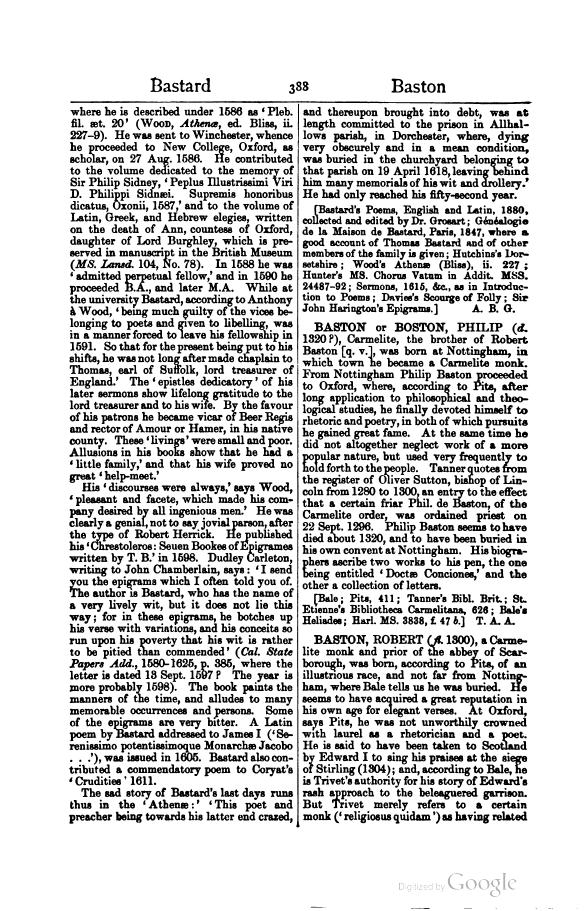where he is described under 1586 as ‘Pleb. fil. æt. 20’ (Wood, Athenæ, ed. Bliss, ii. 227–9). He was sent to Winchester, whence he proceeded to New College, Oxford, as scholar, on 27 Aug. 1586. He contributed to the volume dedicated to the memory of Sir Philip Sidney, ‘Peplus Illustrissimi Viri D. Philippi Sidnæi. Supremis honoribus dicatus, Oxonii, 1587,’ and to the volume of Latin, Greek, and Hebrew elegies, written on the death of Ann, countess of Oxford, daughter of Lord Burghley, which is preserved in manuscript in the British Museum (MS. Landsd. 104, No. 78). In 1588 he was ‘admitted perpetual fellow,’ and in 1590 he proceeded B.A., and later M.A. While at the university Bastard, according to Anthony à Wood, ‘being much guilty of the vices belonging to poets and given to libelling, was in a manner forced to leave his fellowship in 1591. So that for the present being put to his shifts, he was not long after made chaplain to Thomas, earl of Suffolk, lord treasurer of England.’ The ‘epistles dedicatory’ of his later sermons show lifelong gratitude to the lord treasurer and to his wife. By the favour of his patrons he became vicar of Beer Regis and rector of Amour or Hamer, in his native county. These ‘livings’ were small and poor. Allusions in his books show that he had a ‘little family,’ and that his wife proved no great ‘help-meet.’
His ‘discourses were always,’ says Wood, ‘pleasant and facete, which made his company desired by all ingenious men.’ He was clearly a genial, not to say jovial parson, after the type of Robert Herrick. He published his ‘Chrestoleros: Seuen Bookes of Epigrames written by T. B.’ in 1598. Dudley Carleton, writing to John Chamberlain, says: ‘I send you the epigrams which I often told you of. The author is Bastard, who has the name of a very lively wit, but it does not lie this way; for in these epigrams, he botches up his verse with variations, and his conceits so run upon his poverty that his wit is rather to be pitied than commended’ (Cal. State Papers Add., 1580–1625, p. 385, where the letter is dated 13 Sept. 1597? The year is more probably 1598). The book paints the manners of the time, and alludes to many memorable occurrences and persons. Some of the epigrams are very bitter. A Latin poem by Bastard addressed to James I (‘Serenissimo potentissimoque Monarchæ Jacobo …’), was issued in 1605. Bastard also contributed a commendatory poem to Coryat's ‘Crudities’ 1611.
The sad story of Bastard's last days runs thus in the ‘Athenæ:’ ‘This poet and preacher being towards his latter end crazed, and thereupon brought into debt, was at length committed to the prison in Allhallows parish, in Dorchester, where, dying very obscurely and in a mean condition, was buried in the churchyard belonging to that parish on 19 April 1618, leaving behind him many memorials of his wit and drollery.’ He had only reached his fifty-second year.
[Bastard's Poems, English and Latin, 1880, collected and edited by Dr. Grosart; Généalogie de la Maison de Bastard, Paris, 1847, where a good account of Thomas Bastard and of other members of the family is given; Hutchins's Dorsetshire; Wood's Athenæ (Bliss), ii. 227; Hunter's MS. Chorus Vatum in Addit. MSS. 24487–92; Sermons, 1615, &c., as in Introduction to Poems; Davies's Scourge of Folly; Sir John Harington's Epigrams.]
BASTON or BOSTON, PHILIP (d. 1320?), Carmelite, the brother of Robert Baston [q. v.], was born at Nottingham, in which town he became a Carmelite friar. From Nottingham Philip Baston proceeded to Oxford, where, according to Pits, after long application to philosophical and theological studies, he finally devoted himself to rhetoric and poetry, in both of which pursuits he gained great fame. At the same time he did not altogether neglect work of a more popular nature, but used very frequently to hold forth to the people. Tanner quotes from the register of Oliver Sutton, bishop of Lincoln from 1280 to 1300, an entry to the effect that a certain friar Phil. de Baston, of the Carmelite order, was ordained priest on 22 Sept. 1296. Philip Baston seems to have died about 1320, and to have been buried in his own convent at Nottingham. His biographers ascribe two works to his pen, the one being entitled ‘Doctæ Conciones,’ and the other a collection of letters.
[Bale; Pits, 411; Tanner's Bibl. Brit.; St. Etienne's Bibliotheca Carmelitana, 626; Bale's Heliades; Harl. MS. 3838, f. 47 b.]
BASTON, ROBERT (fl. 1300), a Carmelite monk and prior of the abbey of Scarborough, was born, according to Pits, of an illustrious race, and not far from Nottingham, where Bale tells us he was buried. He seems to have acquired a great reputation in his own age for elegant verses. At Oxford, says Pits, he was not unworthily crowned with laurel as a rhetorician and a poet. He is said to have been taken to Scotland by Edward I to sing his praises at the siege of Stirling (1304); and, according to Bale, he is Trivet's authority for his story of Edward's rash approach to the beleaguered garrison. But Trivet merely refers to a certain monk (‘religiosus quidam’) as having related
